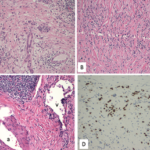No standard criteria exist for the classification of idiopathic RPF, and specific diagnostic biomarkers are not available. The lack of significant hydronephrosis in obstructive nephropathy can be misleading and may delay the pursuit of additional investigations. The one-week course of prednisone this patient received for Bell’s palsy might have contributed to further delays in establishing her diagnosis of RPF.
Remission rates following treatment with corticosteroids vary from 75% to 95%; however, idiopathic RPF is a chronic relapsing disorder and even after successful treatment, the relapse rate may be as high as 72%.9 This warrants close monitoring and follow up over a long period of time after the initial presentation.
In Sum
Although rare, RPF should be considered in the differential diagnosis of patients presenting with acute kidney injury secondary to obstructive uropathy with periaortic masses seen on imaging. Secondary causes should be excluded. The diagnosis of RPF can be made radiologically, without need for a biopsy.
Despite its chronic relapsing course, idiopathic RPF has good renal outcomes and progression to end-stage renal disease is rare with prompt treatment.
 Roshniben Patel, MD, is a hospitalist at Ascension Saint Agnes Hospital, Baltimore.
Roshniben Patel, MD, is a hospitalist at Ascension Saint Agnes Hospital, Baltimore.
 Simon Go, MD, is a chief resident in internal medicine at Ascension Saint Agnes Hospital, Baltimore.
Simon Go, MD, is a chief resident in internal medicine at Ascension Saint Agnes Hospital, Baltimore.
 Akhila Mohan, MD, is a third-year resident in internal medicine at Ascension Saint Agnes Hospital, Baltimore.
Akhila Mohan, MD, is a third-year resident in internal medicine at Ascension Saint Agnes Hospital, Baltimore.
 Maria Pardi, MD, is the associate program director of, and an academic hospitalist in, the internal medicine residency program at Ascension Saint Agnes Hospital, Baltimore.
Maria Pardi, MD, is the associate program director of, and an academic hospitalist in, the internal medicine residency program at Ascension Saint Agnes Hospital, Baltimore.
References
- Adnan S, Bouraoui A, Mehta S, et al. Retroperitoneal fibrosis; A single-centre case experience with literature review. Rheumatol Adv Pract. 2018 Dec;3(1):rky050.
- Kermani TA, Crowson CS, Achenbach SJ, Luthra HS. Idiopathic retroperitoneal fibrosis: A retrospective review of clinical presentation, treatment, and outcomes. Mayo Clin Proc. 2011 Apr;86(4):297–303.
- Nguyen TV, Bader NM, Sidhu H, et al. Acute kidney failure in a young African American male. Case Rep Nephrol. 2019 Feb 17;2019:2591560.
- van Bommel EFH, Jansen I, Hendriksz TR, Aarnoudse ALHJ. Idiopathic retroperitoneal fibrosis: Prospective evaluation of incidence and clinicoradiologic presentation. Medicine (Baltimore). 2009 Jul;88(4):193–201.
- Maritati F, Rocco R, Accorsi Buttini E, et al. Clinical and prognostic significance of serum IgG4 in chronic periaortitis. An analysis of 113 patients. Front Immunol. 2019 Apr 4;10:693.
- Pischke S, Peron JM, von Wulffen M, et al. Chronic hepatitis E in rheumatology and internal medicine patients: A retrospective multicenter European cohort study. Viruses. 2019 Feb 22;11(2):186.
- Goldoni M, Bonini S, Urban ML, et al. Asbestos and smoking as risk factors for idiopathic retroperitoneal fibrosis: A case-control study. Ann Intern Med. 2014 Aug 5;161(3):181–188.
- Vaglio A, Catanoso MG, Spaggiari L, et al. Interleukin-6 as an inflammatory mediator and target of therapy in chronic periaortitis. Arthritis Rheum. 2013 Sep;65(9):2469–2475.
- Cervera-Bonilla S, Garcia Mora M, Rodriguez Ossa P, et al. Medical challenge posed by retroperitoneal fibrosis: Case reports and literature review. Cureus. 2020 Jan 10;12(1):e6624.
- van der Bilt FE, Hendriksz TR, van der Meijden WA, et al. Outcome in patients with idiopathic retroperitoneal fibrosis treated with corticosteroid or tamoxifen monotherapy. Clin Kidney J. 2016 Apr;9(2):184–191.
- Khosroshahi A, Carruthers MN, Stone JH, et al. Rethinking Ormond’s disease: “Idiopathic” retroperitoneal fibrosis in the era of IgG4-related disease. Medicine (Baltimore). 2013 Mar;92(2):82–91.
- Warnatz K, Keskin AG, Uhl M, et al. Immunosuppressive treatment of chronic periaortitis: A retrospective study of 20 patients with chronic periaortitis and a review of the literature. Ann Rheum Dis. 2005 Jun;64(6):828–833.

